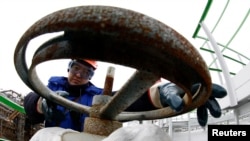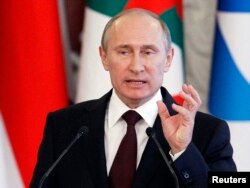LONDON —
European refineries are seeing their bills soar by billions of dollars a year as Russia shifts oil exports to Asia, driving up the values of Urals, one of their preferred crudes.
Huge volumes have switched away from saturated European markets.
From virtually zero five years ago, Russia's oil exports to China and the Pacific coast have risen to 750,000 barrels per day or 17 percent of its total, and they are set to double in the next five years.
“With the International Energy Agency estimating growth in Chinese crude demand from just around 10 million bpd this year to 12 million bpd by 2020, the decision by Russia, currently the world's largest crude producer, to make a dramatic eastward shift in crude exports has a clear rationale,” the Eurasia think-tank said.
The move has proven to be a double win for President Vladimir Putin, who back in 2005 asked his ministers to explain why Urals sold at a discount of $5-$6 per barrel to the European benchmark, dated Brent.
At the time, most industry experts laughed at the remark, saying Putin should go no further than the quality of Urals, which is much inferior to Brent.
Fast forward eight years and Urals barely ever trades at discounts of more than $2 to Brent and often spikes to a premium, including an all-time high of $0.90 per barrel reached this week.
Russia, the world's second-largest oil exporter after Saudi Arabia, is shipping around 3.5 million bpd to Europe. Any $1 per barrel upward move in Urals relative to dated Brent means an extra cost of $1.2 billion a year for European refiners. The difference in values versus 2005 could exceed $5 billion a year.
That is bad news for the sector, in which more than a dozen refineries have closed in the past decade, and more are expected to shut due to the dismal European economy and poor fuel demand.
Experts point to a myriad of factors behind the rise in relative values of Urals, most importantly the U.S. shale oil boom, which created a global glut of sweet Brent-like grades.
By contrast, previously cheap, heavier and sourer grades such as Urals have become scarce. Iranian exports of such crudes have been curtailed by sanctions and Iraqi exports disrupted by pipeline outages.
But a major reason that Urals has become expensive is Russia's shift in flows towards Asia, which U.S.-based think-tank ESAI Energy described as “the 21st century equivalent of Peter the Great's founding of Saint Petersburg as Russia's window on Europe”.
An ESAI report said, “[The] Putin regime is tacitly turning away from 'energy superpower' aspirations in favor of securing stable markets for its energy resources. A Russian shift from West to East and the forging of a stronger China-Russia axis are two of the consequences.”
Irreversible Trend
Russian flows to Asia are coming not only from East Siberian oil fields but also from Vankor and other swing sources that could flow either to Europe or Asia.
“Given oil demand trends in the European market, Russia could be making a turn to the East that is irreversible,” ESAI said. “It seems President Putin has finally learned something about securing access to markets”.
Eurasia also said the industry had questions whether East Siberian fields could ramp up output quickly enough to supply Asia, meaning that more volumes could be diverted away from Europe.
Igor Sechin, the boss of state-controlled oil company Rosneft and one of Putin's closest allies, may have been the man who explained to the Kremlin all the advantages of changing oil flows.
“When Sechin was explaining his plan to re-route oil flows to China, he said that it would lead to a strengthening of Urals in Europe,” a Russian industry source said.
A Rosneft representative said stronger Urals was beneficial for Rosneft but did not comment on Sechin's views.
Industry analysts also say rising Russian domestic refining means Urals will be even more vulnerable to spikes to new record premiums, especially in summer driving season when more fuel is needed to meet demand from a steadily growing number of cars.
“The summer months typically show high refinery utilization rates and coupled with rising exports to Asia means that we do not expect an uptick in shipments to North West Europe,” said David Wech from JBC Energy.
Huge volumes have switched away from saturated European markets.
From virtually zero five years ago, Russia's oil exports to China and the Pacific coast have risen to 750,000 barrels per day or 17 percent of its total, and they are set to double in the next five years.
“With the International Energy Agency estimating growth in Chinese crude demand from just around 10 million bpd this year to 12 million bpd by 2020, the decision by Russia, currently the world's largest crude producer, to make a dramatic eastward shift in crude exports has a clear rationale,” the Eurasia think-tank said.
The move has proven to be a double win for President Vladimir Putin, who back in 2005 asked his ministers to explain why Urals sold at a discount of $5-$6 per barrel to the European benchmark, dated Brent.
At the time, most industry experts laughed at the remark, saying Putin should go no further than the quality of Urals, which is much inferior to Brent.
Fast forward eight years and Urals barely ever trades at discounts of more than $2 to Brent and often spikes to a premium, including an all-time high of $0.90 per barrel reached this week.
Russia, the world's second-largest oil exporter after Saudi Arabia, is shipping around 3.5 million bpd to Europe. Any $1 per barrel upward move in Urals relative to dated Brent means an extra cost of $1.2 billion a year for European refiners. The difference in values versus 2005 could exceed $5 billion a year.
That is bad news for the sector, in which more than a dozen refineries have closed in the past decade, and more are expected to shut due to the dismal European economy and poor fuel demand.
Experts point to a myriad of factors behind the rise in relative values of Urals, most importantly the U.S. shale oil boom, which created a global glut of sweet Brent-like grades.
By contrast, previously cheap, heavier and sourer grades such as Urals have become scarce. Iranian exports of such crudes have been curtailed by sanctions and Iraqi exports disrupted by pipeline outages.
But a major reason that Urals has become expensive is Russia's shift in flows towards Asia, which U.S.-based think-tank ESAI Energy described as “the 21st century equivalent of Peter the Great's founding of Saint Petersburg as Russia's window on Europe”.
An ESAI report said, “[The] Putin regime is tacitly turning away from 'energy superpower' aspirations in favor of securing stable markets for its energy resources. A Russian shift from West to East and the forging of a stronger China-Russia axis are two of the consequences.”
Irreversible Trend
Russian flows to Asia are coming not only from East Siberian oil fields but also from Vankor and other swing sources that could flow either to Europe or Asia.
“Given oil demand trends in the European market, Russia could be making a turn to the East that is irreversible,” ESAI said. “It seems President Putin has finally learned something about securing access to markets”.
Eurasia also said the industry had questions whether East Siberian fields could ramp up output quickly enough to supply Asia, meaning that more volumes could be diverted away from Europe.
Igor Sechin, the boss of state-controlled oil company Rosneft and one of Putin's closest allies, may have been the man who explained to the Kremlin all the advantages of changing oil flows.
“When Sechin was explaining his plan to re-route oil flows to China, he said that it would lead to a strengthening of Urals in Europe,” a Russian industry source said.
A Rosneft representative said stronger Urals was beneficial for Rosneft but did not comment on Sechin's views.
Industry analysts also say rising Russian domestic refining means Urals will be even more vulnerable to spikes to new record premiums, especially in summer driving season when more fuel is needed to meet demand from a steadily growing number of cars.
“The summer months typically show high refinery utilization rates and coupled with rising exports to Asia means that we do not expect an uptick in shipments to North West Europe,” said David Wech from JBC Energy.












